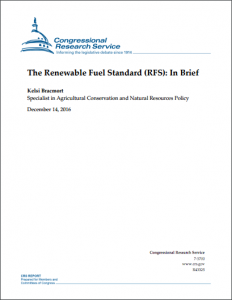Full Title: The Renewable Fuel Standard (RFS): In Brief
Author(s): Kelsi Bracmort
Publisher(s): Congressional Research Service
Publication Date: December 1, 2016
Full Text: Download Resource
Description (excerpt):
Established by Congress as an amendment to the Clean Air Act, the Renewable Fuel Standard (RFS) mandates that U.S. transportation fuel contain a minimum volume of biofuel. The mandated minimum volume increases annually and can be met using both conventional biofuel (e.g., cornstarch ethanol) and advanced biofuel. For a biofuel to be applied toward the mandate, it must be used for certain purposes (transportation fuel, jet fuel, or heating oil) and meet certain environmental and biomass feedstock criteria. A variety of factors (e.g., infrastructure, technology, the E10 blend wall, and limited federal assistance) have led to challenges in meeting volume requirements established by Congress. These challenges have included delays by the Environmental Protection Agency (EPA) in setting the annual volume standards and approving fuel pathways, as well as a lack of cellulosic biofuel production. Further, it is not clear how changes in gasoline consumption and declining oil and fluctuating gasoline prices will impact the biofuel industry. Challenges in implementing the RFS have led to investigations of the RFS by some in Congress and to court rulings on EPA’s regulations. Because of concerns about the implementation and feasibility of the RFS, some Members of Congress have expressed their perspectives on EPA’s proposed and final rules and questioned whether it is time to amend or repeal the RFS or whether the best course is to maintain the status quo. This report provides a basic description of the RFS, including some of the widely discussed issues.
